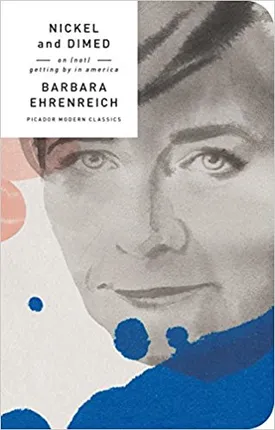Barbara Ehrenreich
Barbara Ehrenreich is an American author, activist, and leading public intellectual. Often referred to as one of America's most influential feminist voices, her work over four decades has drawn attention to class struggles, sparked debates about the morality of work, and challenged neo-liberal economic norms. Through her writings and lectures, Ehrenreich has provided generations of readers and listeners with critical insight into the systems—both economic and political—that shape our lives.
Born in 1941, Ehrenreich grew up in butte, Montana, in a working-class family. As a child and young adult she was fascinated by politics, philosophy, and literature; by the time she graduated from Reed College, she had formulated her own unique brand of socialism. Throughout the 1970s, Ehrenreich worked as a labor and civil rights activist, labor journalist and writer for Ms. Magazine, and a lecturer at the National Conference for New Politics.
In 1983, Ehrenreich published her first book, The Hearts of Men: American Dreams and the Flight from Commitment, which blends personal observation, social-scientific data, and feminist analysis to reveal the contradictions between idealized and lived experiences of ‘masculinity’. This work kickstarted an unprecedented insight into the operations of power, identity, and gender in American culture.
In 1989, Ehrenreich published her groundbreaking book, Fear of Falling: The Inner Life of the Middle Class, which exposed the broken promises of consumer-driven success in the US. This insightful and critical examination of consumer culture, which she later applied to other areas of our lives, was a call to arms against the increasingly pervasive consumer culture of the late 20th century.
Ehrenreich also wrote and spoke extensively on a range of topics, from welfare policy to capital punishment, from sexism to racism. In 1998, she released her most famous work, Nickel and Dimed: On (Not) Getting By In America, which gained her global fame and critical acclaim. The book describes her attempt to live for one month on the wages of three minimum-wage jobs: waitress, maid, and retail worker. The experience revealed the abject physical, emotional, and financial conditions that millions of Americans endure every day, prompting fresh conversations about the plight of American workers and what they need to survive.
Ehrenreich's books, articles, and essays have won numerous awards and she has had her work featured in national and international outlets. For her contributions to the understanding of social and economic justice, she has been widely recognized. In 2001 she was named one of the nation’s 25 most influential working women, and in 2005 she was inducted into the American Academy of Arts and Sciences. In 2009, she was awarded the prestigious Margaret Sanger Award for her passionate and persistent writing on issues of social justice and reproductive rights.
To this day, Ehrenreich continues to challenge the status quo and inspire readers, thinkers, writers, and activists to work towards sustained social, political, and economic transformation in the United States. Her works remain as compelling, controversial, and relevant for today as ever before.

